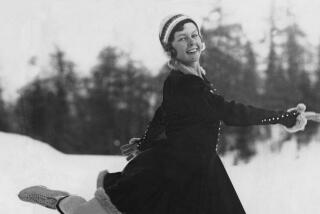THE OLYMPICS WINTER GAMES AT ALBERTVILLE : Her Gold Medal Is No Accident : Speedskating: Germany’s Boerner recovers from hit-and-run injuries to win 1,500. Blair coasts to 21st place.
- Share via
ALBERTVILLE, France — When the Berlin Wall fell, and East German citizens learned detailed information about the supposedly classless society their government had created, there was widespread resentment toward athletes because of the privileged lives they led while winning Olympic medals.
Sometimes, it went beyond resentment. Figure skater Katarina Witt’s jewels were stolen from her apartment. Swimmer Heike Friedrich’s car was vandalized. Long jumper Heike Drechsler received threatening letters, including one that read: “People like you and (Communist Party leader) Erich Honecker should be lined up against a wall and left to fry in the sun.”
But no former East German athlete suffered as much as speedskater Jacqueline Boerner, who is convinced she was run over and left for dead in East Berlin by a hit-and-run driver in an extreme example of the backlash. That is the argument her attorneys will use in court against the defendant, who is pleading not guilty.
All that is certain about the incident is that it resulted in multiple injuries to Boerner’s head, right knee and right ankle. She spent four months in a hospital and another four months in a rehabilitation center and thought her athletic career was finished.
Instead, encouraged by her doctors and sympathetic speedskating officials in reunified Germany, she began training again last September, returned to international competition two months later, and, on Wednesday, won the gold medal in the 1,500 meters at the Winter Olympics.
“It’s like a children’s book,” said her coach, Gunter Schumacher. “Like a fairy tale.”
In order to win, Boerner, 26, had to overcome her rival on the former East German team, Gunda Niemann, who won the 3,000 Sunday at the Olympic Oval and had been favored to leave here with three gold medals until she had to settle for a silver Wednesday. Niemann finished in 2:05.92; Boerner in 2:05.87.
They were so superior to the rest of the field that Seiko Hashimoto’s time of 2:06.88 was more than one second behind Boerner’s and still good enough for third place. Nevertheless, it was a proud day for Hashimoto as she gave Japan its first Winter Olympics medal in a women’s event.
Bonnie Blair, considered a medal contender after winning the gold in the 500 Monday, finished 21st, which would have been a disappointment if she had not coasted through the final 400 meters after realizing that she did not have a chance to finish among the first three.
Unless she was on a pace to win a medal, she and her coach, Peter Mueller, decided beforehand that she would conserve her energy for an event on Friday that is more suited to her sprinting ability, the 1,000.
“I wasn’t going to kill myself since I have another race,” she said.
Neither were the other U.S. skaters factors as Mary Docter finished 15th, Angela Zuckerman 26th and Tara Laszlo 27th. The Netherlands’ Yvonne van Gennip, who won three gold medals four years ago at Calgary, fell 300 meters into the race.
But the story Wednesday was Boerner.
“To be very honest, I didn’t really think I was going to have a chance to win a medal,” she said. “Of course, you can dream. But, to actually get a gold medal, I didn’t expect that.”
She said that she did not want to talk about the circumstances that led to her injuries, but, when reporters persisted, she sighed and recalled the last few moments that she can remember of Aug. 15, 1990.
A few months after she won her first world all-around championship, she and several other speedskaters were training on bicycles on a road in the northern section of East Berlin when one of them exchanged heated words with an angry motorist.
According to Boerner, the motorist swerved toward them, grazing two of the skaters. But it appeared as if that would be the end of it until he turned his car around about 100 meters down the road and drove into the pack at an estimated 45 m.p.h. All of the athletes were able to escape his path except for Boerner.
“Five seconds earlier, I was standing in the road,” she said. “The next thing I knew, the car headed right for me. That’s the last thing I remember. The lawyers are still quibbling about whose fault it was. At this point, I really don’t care.”
While she was in the hospital, the government responsible for creating an unparalleled sports system became a part of history as East and West Germany reunified.
As a result, many former East German athletes who had been provided for by the government since they were children were forced to seek support elsewhere. But reunification, Boerner said, came at a most opportune time for her.
When an athlete was badly injured in East Germany, she said, the system did not always consider it efficient to rehabilitate them. But the new German speedskating federation, administered primarily by West Germans, supported her.
So when she stood on the victory stand Wednesday and heard “Deutschland uber Alles,” the former anthem of West Germany, played for her, she, unlike most former East German athletes who have been there, felt her heart skipping a beat.
“It wasn’t a nationalistic feeling,” she said, “but it was a very beautiful feeling.”
More to Read
Go beyond the scoreboard
Get the latest on L.A.'s teams in the daily Sports Report newsletter.
You may occasionally receive promotional content from the Los Angeles Times.






